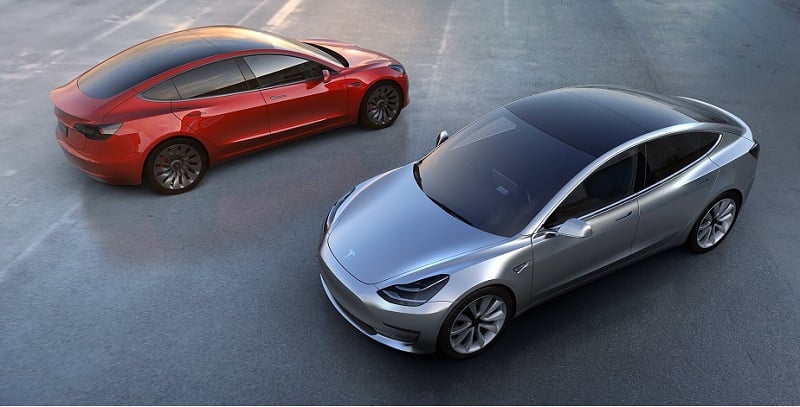
Elon Musk | Eric Piermont/AFP/Getty Images
If you were going to free-associate impressions on the Tesla Model 3 launch, we’re guessing the words “impressive” and “surprising” would mingle with “validating” and “expectation-topping.” We’d also describe it as “crushing” from the point of view of the competition. Looking at the early sales returns for March, it appears Tesla dominated the pack on that front as well with record numbers on the U.S. market. Call it a good week.
Tesla does not publish monthly sales stats, which forces us to follow the largely-reliable InsideEVs plug-in scorecard. While the figures still trickle in from other automakers, the EV site is calling 3,900 Model S and 1,950 Model X (5,850 total) sales on the month. These figures would amount to records in monthly sales by a single car and sales by a manufacturer.

Elon Musk with the Tesla Model X | Justin Sullivan/Getty Images
Compared to other EVs on the market, Tesla blew out the field. Chevy Volt (1,865 sales) and Nissan Leaf (1,246 sales) trailed the Model X and were dominated (a margin over 100%) by the flagship S sedan. InsideEVs reports the Fremont-based electric car company likely filled all its orders and was churning out new deliveries within three weeks of new customers placing orders.
Good news for Tesla was also good news for the industry. If the numbers are anything close to the figures quoted, March will be another record month for plug-in sales in the U.S.; Ford, Kia, Audi, and Porsche had not released their monthly sales at press time. The numbers outstanding from those four and other unaccounted-for models should make an additional 2,000 sales (a conservative estimate) on the month, meaning the record will be shattered by over 20%.

Model 3 | Source: Tesla
These sales estimates piggyback on the wild news cycle dominated by the Model 3 unveiling. Customers formed lines at Tesla stores around the globe to place a hold on the $35,000 model that will get 215 miles on a full charge. By the second day of reservations, chief executive Elon Musk tweeted the reservation count was near 200,000, most of which were sight unseen. Reservations have apparently now come closer to 300,000.
This reception jibes with the surveys taken on what future electric vehicle consumers want. Enthusiasm could not be higher for Tesla, while the Chevy Bolt EV headed to production in 2016 has received a more humble reception. Tesla’s full commitment to charging infrastructure — and thus electric driving — has an obvious appeal here. At the Model 3 launch, Musk said the company would double its Superchargers and quadruple other charging options by the end of 2017.
GM has taken the opposite position, saying infrastructure is the free market and consumer’s problem, not theirs. Meanwhile, the Detroit-based automaker is focusing lobbying efforts on limiting Tesla’s right to sell its EVs in states like Indiana. (Talk about divergent branding strategies.) GM seems perfectly fine coming off as a protectionist force on the market as it aims to restrict an American automaker’s ability to sell vehicles in America.
Most consumers don’t care about the behind-the-scenes wrangling, even if GM is the automaker taxpayers bailed out not too long ago. Corporations have short memories, and we have come to expect such behavior from them. Instead, future EV buyers will soon decide whether the plain Chevy Bolt or less expensive, more stylish Model 3 is the choice to make. Early returns show Tesla crushing GM in enthusiasm. The sales charts aren’t very different.
Check out Autos Cheat Sheet on Facebook
Connect with Eric on Twitter @EricSchaalNY
More from Autos Cheat Sheet:
- 5 Green Car Highlights of the New York Auto Show
- Toyota Prius Prime: The New Standard in Plug-in Economy
- Tesla Model 3 Reservations: No Pandemonium in New York